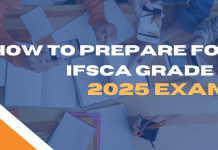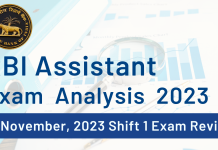Have you ever experienced the mounting pressure that comes with having only one week left to prepare for an exam? Then we are having last-minute exam preparation tips for you.
As students, this situation is all too familiar. The last week of studying before an exam becomes a crucial period where every minute counts. It’s during this time that we need to make the most of our limited time and ensure productive study sessions.
For instance, imagine you have an upcoming exam, such as the RBI Grade B exam, in just seven days. With the clock ticking, you must find ways to effectively prioritize your review of key concepts and allocate dedicated study blocks for essential topics. By utilizing your time wisely during this critical phase, you can increase your chances of success on the exam.
1. Review and Organize your Notes
Start by reviewing all the notes you have taken throughout the semester. Organize them by subject or topic, and focus on the key concepts, formulas, and definitions.
This will help you refresh your memory and identify any gaps in your understanding. By creating an organized system of notes, you can easily access and review the material as needed.
For example, if you’re studying for a RBI Grade B exam, you can review your notes on topics like monetary policy, banking regulations, and economic indicators. Organize your notes by categorizing them based on different sections of the exam, such as phase 1 (objective) and phase 2 (descriptive).
2. Identify and Prioritize Important Topics
Identify the most important topics that are likely to be covered in the exam. Pay extra attention to these areas, as they are more likely to be tested and carry more weight in your final grade.
Spend time reviewing these topics in depth, ensuring you have a solid understanding of the core concepts. By allocating your time wisely to high-priority topics, you can maximize your chance of success in the exam.
For example If you’re preparing for the SEBI Grade A exam, prioritize topics like securities laws, capital markets, and regulatory frameworks. These topics are crucial for understanding the functioning of the securities and exchange markets.
3. Create a Study Schedule
Plan your study time efficiently by creating a daily schedule for the last week before the exam. Allocate specific time slots for each subject or topic, ensuring that you cover all the essential areas.
Be realistic about how much you can cover in a given period of time. Remember to incorporate short breaks to maintain productivity and avoid burnout. A well-structured study schedule will help you stay focused and make progress each day.
Suppose you’re studying for the IBPS PO exam. Create a study schedule that includes specific time slots for subjects like quantitative aptitude, reasoning ability, English language, and general awareness. Ensure that you cover all the important topics within each subject.
4. Practice with Past Exams or Sample Questions
One of the most effective ways to prepare for an exam is to practice with past exams or sample questions. This will help you familiarize yourself with the exam format and style, as well as identify any weak areas that need further revision.
Try to simulate exam conditions as closely as possible by setting a timer and working through the questions under time pressure. Reviewing and analyzing your performance within the constraints of the exam format will enhance your preparation.
For the upcoming government exams 2024, practice with previous year question papers. This will familiarize you with the exam pattern, question types, and the level of difficulty you can expect in the actual exam.
5. Engage in Active Learning Techniques
Instead of passively reading your notes, engage in active learning techniques such as summarizing, paraphrasing, or teaching the material to someone else.
Active learning has been shown to improve understanding and retention of information. For example, you can create flashcards, take Beepedia with key terms or concepts and use them for self-quizzing. By actively involving yourself in the learning process, you are more likely to remember and understand current affairs.
If you’re preparing for the RBI Grade B DEPR exam, actively learn concepts by summarizing and explaining them in your own words. For example, create concise summaries of banking-related statutes, such as the RBI Act, Banking Regulation Act, or Negotiable Instruments Act.
6. Group Study Sessions
Consider organizing group study sessions and enroll in online courses with your fellow mates. Explaining concepts to others and engaging in discussions can deepen your understanding and help you identify any misconceptions.
Working with peers who may have different perspectives and insights can be beneficial for your learning. However, ensure that the group stays focused and productive. Avoid distractions and maintain a clear agenda for the study session.
7. Take Breaks and Practice Self-Care
While it’s important to dedicate time to studying, it’s equally crucial to take breaks and practice self-care. Make sure to get enough sleep, eat well, and exercise regularly.
Taking care of your physical and mental well-being will enhance your concentration and overall performance during the exam. Remember that studying excessively without breaks can lead to diminishing returns. Taking short, rejuvenating breaks will help you stay fresh and focused.
While preparing for the latest government exam, take regular breaks to relax and recharge. Engage in activities like meditation, yoga, or hobbies that help reduce stress and maintain focus.
8. Utilize Visual Aids and Mnemonics
Visual aids such as diagrams, flowcharts, and graphs can help you better understand complex concepts and reinforce your memory. Creating visual representations of the material can make it easier to grasp and remember.
Additionally, mnemonics or memory techniques can aid in remembering important information, such as acronyms or rhymes. By utilizing these tools, you can make your studying more engaging and effective.
9. Review Old Assignments and Quizzes
Go through your old assignments, quizzes, and homework problems. These can be a valuable resource to identify recurring patterns or types of questions that may appear in the exam.
Reviewing your mistakes and understanding the correct solutions will help you avoid similar errors in the actual exam. Use these assessments as a way to gauge your progress and reinforce your knowledge.
10. Simulate Exam Conditions
As the exam date approaches, simulate exam conditions by practicing under timed conditions. Set a timer and attempt a mock test or a set of sample questions to simulate the pressure and time constraints of the actual exam.
This will help you become more comfortable and efficient in managing your time during the exam. Practicing under exam-like conditions will also help alleviate test anxiety and build confidence in your abilities.
11. Seek Clarification from the Instructor or Peers
If you have any doubts or areas of confusion, don’t hesitate to seek clarification from your instructor or classmates. Asking questions and discussing challenging concepts can provide you with the clarity you need to ace the exam.
Be proactive in reaching out for help and make use of resources such as office hours or study groups. The more you understand the material, the better prepared you will be.
12. Stay Positive and Manage Stress
Lastly, maintain a positive mindset and manage exam stress effectively. Remind yourself of your preparation efforts and believe in your abilities. Visualization techniques can be helpful in reducing stress and increasing confidence.
Take deep breaths, practice relaxation techniques, or engage in activities that help you unwind. It’s important to approach the exam with a calm and positive mindset to perform at your best.
Conclusion
The last week of studying before an exam requires focus, planning, and discipline. Remember, preparation is key, so stay motivated, manage your time wisely, and have confidence in your abilities. As you continue your preparations, consider your exam helping buddy ixamBee, we offer comprehensive study materials, practice tests, and expert guidance for various competitive exams.
With ixamBee’s support, you can further enhance your preparations and boost your chances of success. Don’t hesitate to explore their offerings and take advantage of the valuable resources they provide. Good luck on your exam!
To help you prepare 50% faster for competitive exams, ixamBee provides a free Mock Test Series and all the Current Affairs in English and Current Affairs in Hindi in the BeePedia capsules for GA Preparation. You can also get the latest updates for Bank PO, Bank Clerk, SSC, RBI Grade B, NABARD, and Other Government Jobs.
Read Also
Everything to Know About the SEBI Grade A 2024 Exam Syllabus
How to Prepare for GIC Assistant Manager Exam
The Complete Guide to Current Affairs Preparation for Banking Exams















